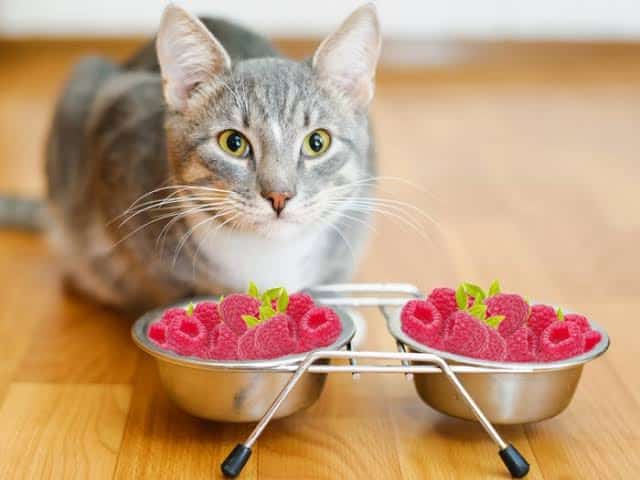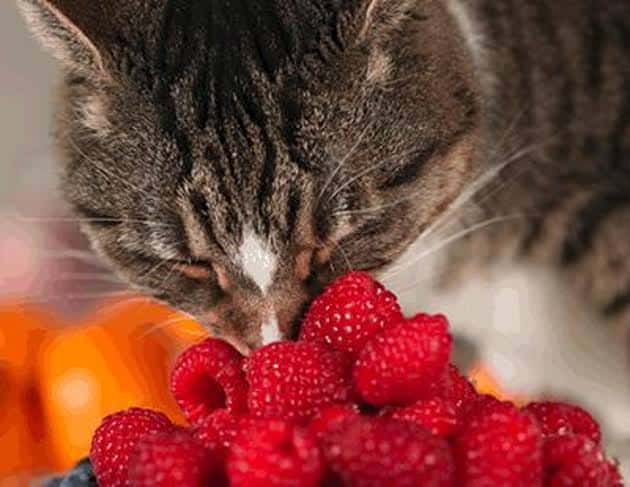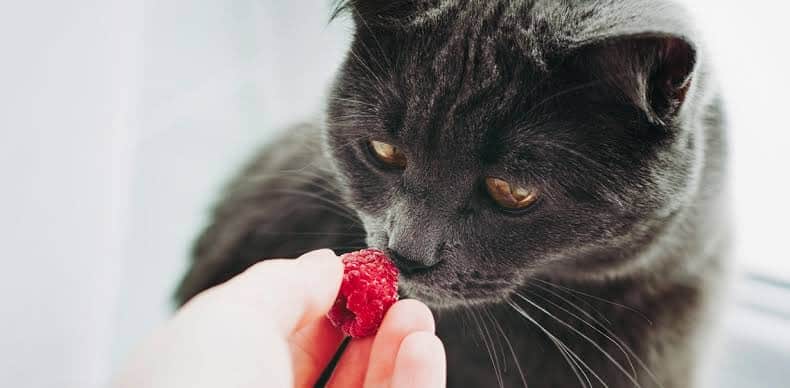Are you worried about your cat’s diet and want to know if they feed on Raspberries? Then, this article is for you. The topic is “Can Cats Eat Raspberries?”. So, if you’ve ever wondered whether it’s safe to share your raspberry snack with your cat, then worry no more. Let’s go into the details and uncover the truth about cats and raspberry consumption.
Introduction To Raspberries
Raspberries, with their vibrant color and sweet-tart flavor, are not only delicious but also packed with nutrients. Whether you’re a fan of these juicy berries or simply curious about them, you will discover everything you need to know about raspberries.
Recommended: Is Bamboo Toxic to Cats?

Health Benefits Of Raspberries
Raspberries are nutritional powerhouses, loaded with vitamins, minerals, and antioxidants. One of their most notable health benefits is their high antioxidant content, which helps protect the body from oxidative stress and inflammation. These antioxidants, including vitamin C, quercetin, and ellagic acid, contribute to raspberries’ potential to reduce the risk of chronic diseases such as heart disease and cancer.
Additionally, raspberries are an excellent source of dietary fiber, which promotes digestive health and helps regulate blood sugar levels. With a low glycemic index, they are a smart choice for individuals managing diabetes or those aiming to maintain stable energy levels throughout the day.
Cultivation Practices Of Raspberries
Raspberries thrive in temperate climates and are relatively easy to grow, making them a popular choice for home gardeners and commercial growers alike. When cultivating raspberries, it’s essential to choose a sunny location with well-drained soil.
There are several varieties of raspberries, including summer-bearing, fall-bearing, and everbearing types. Summer-bearing raspberries produce fruit on second-year canes, while fall-bearing varieties bear fruit on first-year canes in the fall. Everbearing raspberries, as the name suggests, produce fruit throughout the growing season.
To ensure a bountiful harvest, proper pruning is essential. Summer-bearing raspberries should be pruned after fruiting, while fall-bearing and everbearing varieties benefit from pruning in both the spring and the fall.
Culinary Uses Of Raspberries
Raspberries are incredibly versatile in the kitchen, adding a burst of flavor and color to a wide range of dishes. Whether eaten fresh, frozen, or cooked, raspberries enhance both sweet and savory recipes.
Fresh raspberries are delightful on their own or as a topping for yogurt, oatmeal, or salads. They can also be incorporated into smoothies, jams, and desserts such as pies, tarts, and cakes. For a refreshing treat, try freezing raspberries and blending them into homemade sorbets or popsicles.
In savory dishes, raspberries can be used to create flavorful sauces or glazes for meats such as chicken or pork. Their bright acidity pairs well with rich cheeses, making them a fantastic addition to cheese platters and appetizers.
Nutritional Value Of Raspberries
Raspberries are not only delicious but also packed with essential nutrients that contribute to overall health and well-being, both for humans and potentially for our feline friends. Let’s delve into the nutritional profile of raspberries and explore the valuable components they provide:
1. Antioxidants: Raspberries are rich in antioxidants, including vitamin C, quercetin, and ellagic acid.
2. Dietary Fiber: Fiber is essential for digestive health, and raspberries are an excellent source of both soluble and insoluble fiber. This fiber content aids in digestion, promotes regularity, and may help regulate blood sugar levels.
3. Vitamins and Minerals: Raspberries contain a variety of vitamins and minerals, including vitamin K, manganese, and potassium. These nutrients play vital roles in various bodily functions, such as blood clotting, bone health, and fluid balance.
4. Low in Calories: For those watching their calorie intake, raspberries are a smart choice. They are low in calories but high in nutrients, making them a satisfying and nutritious option for snacking or incorporating into meals.
5. Hydration: Raspberries have a high water content, which helps keep the body hydrated. Proper hydration is essential for overall health, supporting functions such as temperature regulation, nutrient transportation, and toxin removal.
Recommended: Are Poinsettias Poisonous to Cats?

Are Raspberries Safe For Cats?
Raspberries themselves are not toxic to cats, which means they won’t cause immediate harm if your cat consumes a small amount. However, it’s essential to consider a some factors before offering raspberries to your feline friend.
Health Benefits Of Raspberries To Cats
While raspberries may not be a staple in a cat’s diet, they can offer some potential health benefits when given in moderation. Let’s explore how raspberries can contribute to your cat’s well-being:
1. Antioxidants: Raspberries are rich in antioxidants, such as vitamin C and quercetin, which can help neutralize harmful free radicals in your cat’s body. These antioxidants may help support your cat’s immune system and protect against certain diseases.
2. Hydration: Raspberries have a high water content, which can help keep your cat hydrated, especially if they are not drinking enough water on their own. Proper hydration is essential for maintaining healthy kidney function and overall well-being in cats.
3. Fiber: Raspberries contain dietary fiber, which can help support your cat’s digestive health.
4. Weight Management: Due to their low-calorie content and high fiber content, raspberries can be a healthy treat option for overweight or obese cats. Offering raspberries as a low-calorie snack can help satisfy your cat’s cravings without contributing to excess weight gain.
5. Dental Health: The crunchy texture of raspberries can help promote dental health in cats by removing plaque and tartar buildup on their teeth. Chewing on raspberries can also help stimulate your cat’s gums and promote overall oral hygiene.
6. Mental Stimulation: Offering raspberries as a treat can provide mental stimulation for your cat, especially if you hide them in interactive toys or puzzle feeders. Engaging your cat in activities that encourage natural behaviors, such as hunting and foraging, can help keep their minds sharp and alleviate boredom.
Risk Associated With Cat Ingestion Of Raspberries
While raspberries can offer some potential health benefits for cats when given in moderation, there are also risks associated with their ingestion. It’s essential to be aware of these risks to ensure the safety and well-being of your feline friend. Let’s explore some of the potential risks associated with cats eating raspberries:
1. Digestive Upset
Cats have sensitive digestive systems, and introducing new foods like raspberries can sometimes lead to gastrointestinal upset. Eating too many raspberries or consuming them too quickly can result in symptoms such as diarrhea, vomiting, or abdominal discomfort in some cats.
2. Allergic Reactions
While rare, some cats may be allergic to raspberries or certain compounds found in them. Signs of an allergic reaction in cats may include itching, skin irritation, swelling, or difficulty breathing. If you suspect your cat is having an allergic reaction after consuming raspberries, seek veterinary care immediately.
3. Choking Hazard
Raspberries have small seeds that could pose a choking hazard for cats, especially if they eat them whole or too quickly. Ingesting raspberry seeds can also cause intestinal blockages or irritation in some cases.
4. Dental Issues
The natural sugars found in raspberries could contribute to dental issues such as tooth decay or gum disease if your cat consumes them frequently or in large quantities. Additionally, the acidic nature of raspberries could potentially erode tooth enamel over time.
5. Obesity
While raspberries are low in calories, feeding them to your cat in excessive amounts could contribute to weight gain over time.
6. Pesticide Contamination
Like other fruits and vegetables, raspberries may contain pesticide residues if not properly washed before consumption. Cats are more sensitive to certain pesticides than humans, so it’s essential to wash raspberries thoroughly or choose organic options when feeding them to your cat.
Recommended: Are Peonies Poisonous to Cats?

How To Feed Raspberries To Cats Safely
Feeding raspberries to your cat can be a fun and tasty way to offer them a healthy treat, but it’s essential to do so safely to avoid any potential risks. Here are some tips on how to feed raspberries to your cat safely:
1. Introduce Raspberries Gradually:
If your cat has never tried raspberries before, it’s best to introduce them gradually. Start by offering a small piece of raspberry and observe your cat’s reaction.
2. Wash Raspberries Thoroughly:
Before offering raspberries to your cat, be sure to wash them thoroughly to remove any pesticides or contaminants. You can rinse raspberries under cold running water or soak them in a vinegar and water solution for a few minutes before rinsing.
3. Offer Raspberries in Moderation:
While raspberries can offer some health benefits for cats, it’s essential to offer them in moderation. Too many raspberries at once could lead to digestive upset or other issues in some cats. Offer raspberries as an occasional treat rather than a regular part of your cat’s diet.
4. Monitor Your Cat’s Response:
After offering raspberries to your cat, monitor them closely for any signs of digestive upset or adverse reactions. If your cat experiences diarrhea, vomiting, or other symptoms after eating raspberries, discontinue feeding them and consult with your veterinarian.
5. Remove Seeds if Necessary:
Raspberry seeds can pose a choking hazard for cats, especially if they eat them whole. If you’re concerned about your cat ingesting raspberry seeds, you can remove them before offering raspberries to your cat. Simply crush the raspberries and strain out the seeds before feeding them to your cat.
6. Consider Frozen Raspberries:
Frozen raspberries can be a refreshing and crunchy treat for cats, especially on hot days. You can offer frozen raspberries to your cat as a cool treat straight from the freezer, or you can blend them into a homemade cat-friendly sorbet or popsicle.

Alternatives To Raspberries For Cats
While raspberries can be a tasty and nutritious treat for some cats, others may not enjoy the flavor or may have digestive sensitivities to them. If your cat isn’t a fan of raspberries or if you’re looking for alternative treats, there are plenty of other options to consider. Here are some alternatives to raspberries that you can offer to your cat:
1. Commercial Cat Treats
Commercially available cat treats are specifically formulated to meet the nutritional needs of cats while providing a tasty reward. These treats come in a variety of flavors, textures, and shapes, making them appealing to cats of all preferences.
2. Cooked Meat
Cooked meats such as chicken, turkey, or fish can be a delicious and protein-packed treat for your cat. Just be sure to remove any bones, skin, and excess fat before offering it to them.
3. Freeze-Dried Meat Treats
Freeze-dried meat treats are another popular option for cat owners looking for natural and nutritious treats. These treats are made from real meat and retain much of their natural flavor and nutrients. They come in various protein sources, including chicken, beef, and fish, catering to different taste preferences.
4. Catnip
Catnip is a herb that can induce a temporary state of euphoria or excitement in cats when they smell or consume it. Offering your cat a small amount of catnip as a treat can provide mental stimulation and enrichment. However, not all cats respond to catnip, so it’s essential to observe your cat’s reaction the first time you offer it to them.
5. Homemade Treats
If you enjoy cooking, you can make homemade cat treats using simple, cat-friendly ingredients such as cooked chicken or tuna, pureed baby food, or pumpkin puree. There are plenty of cat treat recipes available online that you can try out and customize to your cat’s preferences.
6. Fresh Vegetables
While cats are primarily carnivores, some may enjoy the occasional nibble on certain vegetables. Safe options for cats include cooked or steamed vegetables such as green beans, peas, or carrots. Just be sure to offer them in small amounts and monitor your cat’s response.
Recommended: Are Carnations Toxic To Cats?
Conclusion
While cats can technically eat raspberries without immediate harm, it’s essential to consider several factors before offering them to your feline friend. Raspberries can offer some potential health benefits for cats, such as antioxidants, hydration, and fiber, but they should only be given in moderation and as an occasional treat. It’s crucial to monitor your cat’s response to raspberries and watch for any signs of digestive upset or adverse reactions.
If your cat enjoys raspberries, be sure to wash them thoroughly to remove any pesticides or contaminants, and consider removing the seeds to prevent choking hazards. However, if your cat does not tolerate raspberries well or if you’re looking for alternative treats, there are plenty of other options available, such as commercial cat treats, cooked meats, freeze-dried meat treats, catnip, and homemade treats.
